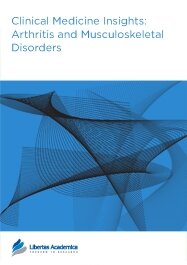

Publication Date: 23 Jul 2008
Journal: Clinical Medicine Insights: Arthritis and Musculoskeletal Disorders

Periosteal new bone formation (PNBF) is the means by which appositional bone growth normally takes place on the surfaces of compact bone. Alterations in the periosteal microenvironment trigger complex interactions between osteoblasts and endothelial cells to promote PNBF. Physiologic processes like mechanical stress result in normal PNBF; but, a variety of pathologic processes result in excessive PNBF. The production of sufficient bone to be detectable by conventional radiography is a common feature of diverse etiologies, including infection; inflammation; prostaglandin E2 administration for ductal-dependent congenital heart disease; metabolic and hormonal abnormalities; neoplasms; fracture repair; systemic hypoxia; and hypertrophic osteoarthropathy. While the clinical settings and distribution of affected bone sites in these conditions are different, the histopathology of the PNBF is essentially identical; so, it seems logical that a common pathway might mediate them all. By combining the observations and insights gained from osseous research and studying the clinical pathology of these diverse conditions, we constructed a comprehensive pathway to explain PNBF. In doing so, it seems likely that Vascular Endothelial Growth Factor (VEGF) is the most likely common mediator of the pathways that lead to PNBF.
PDF (4.51 MB PDF FORMAT)
RIS citation (ENDNOTE, REFERENCE MANAGER, PROCITE, REFWORKS)
BibTex citation (BIBDESK, LATEX)
The staff of Libertas Academica have been exceptionally easy to work with. They continually keep authors updated and are responsive to all requests. They were also very flexible to work with when I had some challenges from my end as an author. Article reviews were received very promptly and were constructive and helpful for improving the manuscript. The online submission system was easy to use and provided clear guidance on what was needed. I highly ...

All authors are surveyed after their articles are published. Authors are asked to rate their experience in a variety of areas, and their responses help us to monitor our performance. Presented here are their responses in some key areas. No 'poor' or 'very poor' responses were received; these are represented in the 'other' category.See Our Results
Copyright © 2013 Libertas Academica Ltd (except open access articles and accompanying metadata and supplementary files.)
FacebookGoogle+Twitter
PinterestTumblrYouTube